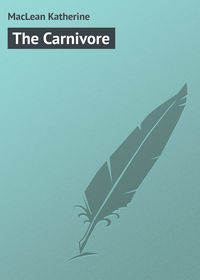Kitobni o'qish: «The Carnivore»
The beings stood around my bed in air suits like ski suits, with globes over their heads like upside-down fishbowls. It was all like a masquerade, with odd costumes and funny masks.
I know that the masks are their faces, but I argue with them and find I think as if I am arguing with humans behind the masks. They are people. I recognize people and whether I am going to like this person or that person by something in the way they move and how they get excited when they talk; and I know that I like these people in a motherly sort of way. You have to feel motherly toward them, I guess.
They all remind me of Ronny, a medical student I knew once. He was small and round and eager. You had to like him, but you couldn't take him very seriously. He was a pacifist; he wrote poetry and pulled it out to read aloud at ill-timed moments; and he stuttered when he talked too fast.
They are like that, all fright and gentleness.
I am not the only survivor – they have explained that – but I am the first they found, and the least damaged, the one they have chosen to represent the human race to them. They stand around my bed and answer questions, and are nice to me when I argue with them.
All in a group they look half-way between a delegation of nations and an ark, one of each, big and small, thick and thin, four arms or wings, all shapes and colors in fur and skin and feathers.
I can picture them in their UN of the Universe, making speeches in their different languages, listening patiently without understanding each other's different problems, boring each other and being too polite to yawn.
They are polite, so polite I almost feel they are afraid of me, and I want to reassure them.
But I talk as if I were angry. I can't help it, because if things had only been a little different … "Why couldn't you have come sooner? Why couldn't you have tried to stop it before it happened, or at least come sooner, afterward…?"
If they had come sooner to where the workers of the Nevada power pile starved slowly behind their protecting walls of lead – if they had looked sooner for survivors of the dust with which the nations of the world had slain each other – George Craig would be alive. He died before they came. He was my co-worker, and I loved him.
